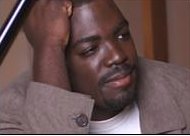Marcus Coleman
|
|
The ninth grade would see Marcus enter the prestigious Alexander Hamilton High School Academy of Music. There, he was challenged to understand the dynamics of ensemble performance, music composition and arranging. He was also the recipient of the 1st annual LAUSD All-Star High School Jazz Piano Award. In the tenth, eleventh and twelfth grade, Marcus won many jazz festival awards for best jazz pianist and two Grammy in the Schools Jazz Piano Scholarships. A new NBC television series called “Name Your Adventure” asked Marcus to star in an episode in which he would appear on the “Tonite Show” as part of the Branford Marsalis Band. Soon after Marcus began writing and arranging music for his own 17 piece big band. While making an adjustment to college life, Marcus also began touring with artist like Monica (1999), Brian McKnight (1999-2000), Kevon Edmonds (2000-2001), Chante Moore (2000-2002) to name a few. On a chance meeting, Marcus was presented with an opportunity to work for Kurt Farquhar Productions. There he was assigned several television shows to score and ghost write for Kurt; which included “The Proud Family” (Disney),”Girlfriends” (UPN), “All Of Us” (UPN), “One On One” (UPN), “The Parkers” (UPN) and Soul Food (Paramount/Showtime). Marcus also co-wrote the theme for “Dance 360” (Paramount), and “Steve Harvey’s Big Time” (WB). Marcus is currently working on a solo project due to release in November 2005. I always wanted to do a project like this, a collection of music that really represents all of my musical influences and embodies a great deal of musical energy. I love music that has an immense beat and authentic musical colors. Growing up with Hip-Hop really distracted my musical development. Because I grew up with such an unhinged diet of Hip-Hop (ya’ll remember 1580 K-DAY) verses anything else, it took me a little longer to discover the great keyboard masters of old. The only one that I knew of was Herbie Hancock (and that was because he had a video out called “Rock-It”). Later on, I discovered Chick Corea and Oscar Peterson. To this day, I still can’t play like them. I can’t even play their transcribed works…even when I try to play them slowly! But they have written my personal musical instruction book. Throughout this entire project you can hear all my main influences and a few more including artist like Joe Sample and Bobby Lyle. When I was 13 years old, there was a radio station called KKGO. They use to play some great music (I wish that somebody would tell me who the DJs were). This record was conceived from the music they use to play! I used to tape the music and then go into the dining room (that’s where my little cheesy keyboard setup used to be) in my mothers’ house and play those songs note for note. I never knew who the artist were because they never announced who was playing. For years I would play these tunes that nobody knew. Then one day, they played this one particular tune that probably marked the beginning of everything you hear in me today. I transcribed that piece so tuff that the tape broke. I didn’t know any professional musicians at that time to play the music for in hopes of discovering who this particular artist was, so it was forever lost. The only proof I had that the song actually existed was the manuscript paper I wrote it down on. Years later, I was going over to one of my other moms house (I Love You Clarice) for an NAACP Act-So Awards party. As I walked in, playing on her stereo was that tune that had been floating around in my head for 5 years. She said, “You don’t know who that is? That’s Bobby Lyle; that boy is tuff on the piano.” I’ve never felt so much pressure to listen to a record in my life because every musical statement that he made further maginfied how far I had to go to sound like that original tune I heard on the radio. By the way, that tune was called “Tropical”. During those formative years, I discovered another record that to this day, makes me cry on the inside and weak on the outside. My mother used to listen to a lot of adult contemporary music like Anita Baker and Luther Vandross all of the time. She had crates and crates of records. One day I decided to curiously look through all her records to see what she had. As I was rummaging through them, I came across a Herbie Hancock record called “Sunlight”. Now, I was emotionally attached to this record before I even heard the music because when you turned the record over to the back cover all you saw was Herbie standing in the middle of what looks like keyboard heaven on earth. And you know, to a young keyboard player that’s a dream come true! When I finally listen to the record, I discovered the most influential musical vocabulary I had ever heard (buy the record and find out what I’m talking about). Everything that was, is and will be hip-hop/urban music was pre-established by Herbie in those years but more clearly on that record. Roger Troutman can’t “touch” Herbie when it comes to the talk box. For those who don’t know…The talk box is an instrument by which a mic is connected to a keyboard and by playing the notes you want, you can generate whatever vocal pitch you desire. But now as I have musically matured, I'm hopeful that listeners will appreciate this departure from mainstream adult contemporary music and are excited about it as I am! His first album
"Marcus Coleman" is available at CDBaby.
|
